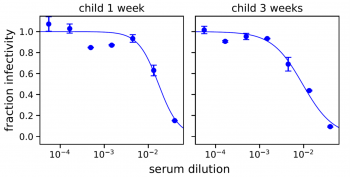Are Children Making Antibodies That Will Protect Against Future COVID-19 Infections?
5.26.2020 | Seattle Children's Press Team
 More than 50 research studies to understand, detect, treat and prevent the novel coronavirus in children and families have launched at Seattle Children’s since the virus emerged in late 2019. The following post is part of the “Quest(ion) for Discovery” series highlighting this research in progress and the search for answers that could result in major scientific breakthroughs that save lives and slow the spread of the virus.
More than 50 research studies to understand, detect, treat and prevent the novel coronavirus in children and families have launched at Seattle Children’s since the virus emerged in late 2019. The following post is part of the “Quest(ion) for Discovery” series highlighting this research in progress and the search for answers that could result in major scientific breakthroughs that save lives and slow the spread of the virus.
When Dr. Janet Englund, a member of the Center for Clinical Translational Research at Seattle Children’s Research Institute, received news in late February that a Seattle Children’s patient had tested positive for the novel coronavirus and represented the first example of community transmission in Washington state, she knew things as we knew them were never going to be the same.
Englund, who has long studied respiratory viruses and their transmission in children and frequently provides her expertise as part of national scientific advisory panels, believed we were facing something very different from any pandemic Seattle – or the world for that matter – had ever seen before.
She and her collaborators quickly proposed supplements to their existing studies primarily focused on seasonal influenza, so they could begin to learn about how the new coronavirus impacts children. One study, which she discusses in greater detail here, asks: Are children making antibodies that will protect against future COVID-19 infections?
Englund: There are so many questions that need answers to improve our understanding of the coronavirus and COVID-19 in children, but for this study, we are looking at children under age 18 with a known or suspected COVID-19 infection to see if they make a certain type of antibody that works against the coronavirus. We also want to learn whether that antibody offers protection – or immunity – and for how long. Those are incredibly important questions as we have a virus that’s becoming embedded in the population.
Working with Jesse Bloom’s lab at Fred Hutchinson, we will assess whether children have functional antibodies capable of neutralizing the coronavirus. We will look at this over time by taking two to three blood draws from participants every year over the next three years. Our goal is to enroll 50 children a year, and we’ve already enrolled our first several participants.

We’re very interested in learning if this neutralizing antibody changes or decreases over the course of the study. In our previous work with the flu, we have shown that neutralizing antibodies are important in driving evolution of influenza viruses and potentially protecting persons from infection with flu of the exact same strain.
Other studies I am involved with will answer equally important questions by tracking patients coming into Seattle Children’s Emergency Department with the coronavirus, in collaboration with Dr. Eileen Klein, and studying the prevalence of coronavirus antibodies in our higher-risk patient populations, such as children with renal or liver transplants.
I think Seattle is in an interesting position to lead the U.S. in providing some of the first clues as to if infection can produce immunity to the coronavirus in children. It takes up to 45 days to generate antibodies after infection, and as one of the first cities in the U.S. to face the coronavirus, we’re now at the crossroads of having this extremely valuable information.
This trial is now recruiting individuals under age 18 with known or suspected COVID-19 since March 2020. To inquire about participating in this study, please email IDResearch@seattlechildrens.org or call 206-884-1100.
Resources